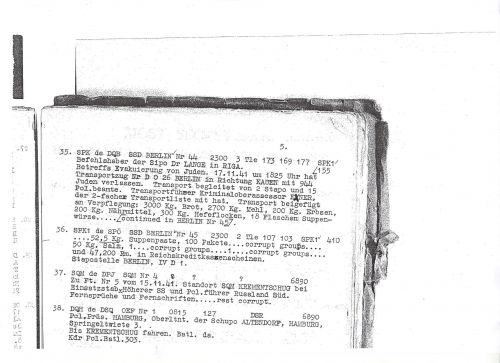Deportations to Riga from the Reich

Police Decode - Berlin to Dr. Lange in Riga -Deportation of Jews
Report on the Evacuation of Jews to Riga
Salitter, Captain of the Schutzpolizei
The transport of Jews scheduled for 11.12.1941, includes 1007 Jews from the towns of Duisburg, Krefeld and some smaller towns and rural communities of the Rhine -Westphalian industrial district. Dusseldorf was represented by only 19 Jews. The transport was composed of Jews of both sexes and various ages, from babies up to the age of 65.
The departure of the transport was scheduled for 9.30 hours. The Jews were therefore assembled on the platform by 4.00 hours in readiness for loading. The railway, however, reportedly due to manpower shortage, could not assemble the special train so early, so the loading of the Jews could not be started before about 9.00 hours. Because the railway urged that the train should leave as nearly as possible according to schedule, the loading was undertaken with the greatest haste.
On the way from the slaughter-house to the platform, a male Jew had attempted to commit suicide by throwing himself under a train. He was caught on the tray of the tram, however, and only slightly injured. At first he pretended to be dying, but became very lively during the journey once he realised that he could not avoid the fate of evacuation.
Similarly, an elderly Jewess had left the platform un-noticed - it was raining and very dark - taken refuge in a nearby house, taken off her clothes and sat down in a toilet. She was discovered by a woman cleaner, however, so that she could be brought back to the transport. The loading of the Jews was completed at about 10.15 hours. After shunting several times, the train then left the goods station of Dusseldorf- Derendorf at about 10.30 in the direction of Wuppertal. The journey then went according to plan and the train passed through the following towns: Wuppertal, Hagen, Schwerte, Hamm. At about 18.00 hours Hannover-Linden was reached. At 3.30 hours the train stopped for half an hour at Berlin-Lichterfelde. The train was already 155 minutes behind schedule. The journey was continued via Kuestrin, Kreuz, Schneidemuehl, Firschau.....
Just outside Konitz the train broke up because of overloading. A heating pipe was also broken. Improvised repairs were carried out and the train was able to continue its journey to Konitz. At 12.10 hours the train left Konitz. The journey then continued via Dirschau, Marienburg, Elbing to Koenigsberg (Pr). At 1.50 hours it went onto Tilsit. At 5.15 hours the frontier -station of Laugszargen and, 15 minutes later, the Lithuanian station of Tauroggen were reached. From there onwards the journey to Riga should normally have taken only another 14 hours. As a result of the single-line track and the trains secondary importance in dispatch , there were often long delays at the stations, before the train could continue its journey.
At Schaulen Station (1.12 hours), the escort personnel were catered for adequately and well by Red Cross nurses. Barley soup with beef was served. At 19.30 hours Mitau (Latvia) was reached. Here a considerable drop in the temperature was noticeable. It started to snow and frost followed. The arrival in Riga took place at 21.50 hours, where the train was detained in the station for one-and a half hours. Here I ascertained that the Jews were not destined for the Riga ghetto, but were to be accommodated in the Sirotawa Ghetto, 8km north-east of Riga. On 13.12, at 23.35 hours, the train after much shunting up and down the line, reached the military platform on Sirotawa Station. The train remained standing, without heating. The temperature outside was already 12 degrees below zero. As the police detachment who were to take command were not present, my men continued to guard the train.
The handing-over of the train took place at 1.45 hours, when the guard was taken over by six Latvian policemen. As it was already after midnight, it was dark and the platform was heavily iced over, the unloading and conveying of the Jews to the assembly ghetto 2km away could not take place before early on Sunday when it got light. My escort party was taken to Riga in two police patrol cars made available by the police detachment., and given overnight accommodation at about 3.00 hours. I myself received shelter in the guest house of the Higher SS and Police Chief, Petersburger Hof, Am Schlossplatz 4.
Signed: Salitter, Captain of the Schutzpolizei
Sources
Gerhard Schoenberner, The Yellow Star, Corgi Books, London 1978
Documents - National Archives, Kew
© Holocaust Historical Society 2018

